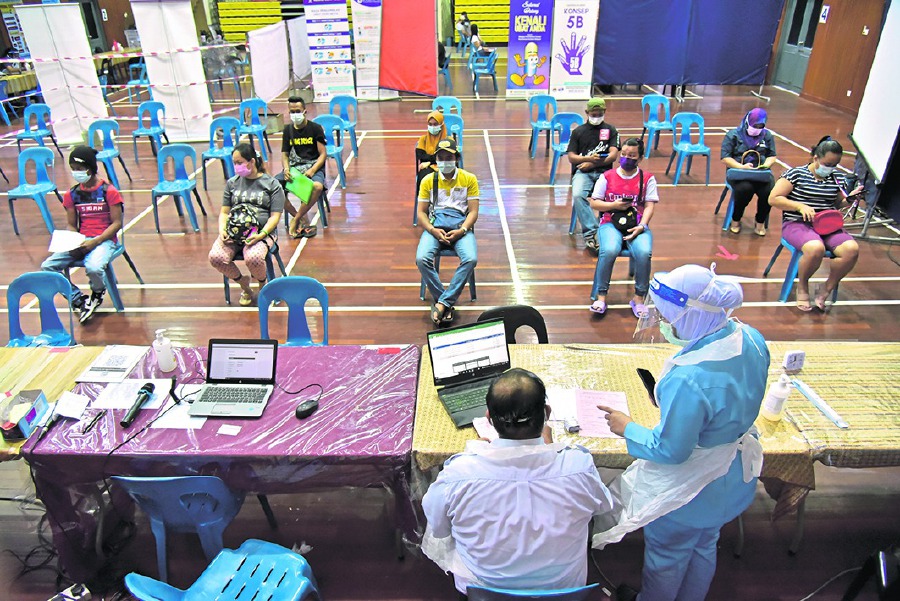By Olivia Miwil - August 16, 2021 @ 9:11am
The high vaccination rate in Labuan has led to a significant reduction in Covid-19 cases and deaths.
Four months ago, the public was doubtful whether the Labuan Health Department could handle the crisis caused by the spike in Covid-19 cases.
However, despite limitations in facilities — with only one 122-bed hospital on the island and only about 1,200 staff — the Labuan Health Department brought the situation under control with the help of a field hospital.
Labuan, an economic centre and a duty-free island, is now in the third phase of the National Recovery Plan.
With almost all its adult population vaccinated, Labuan has had only less than five Covid-19 patients experiencing severe symptoms that require intensive care.
Labuan Health Department director Dr Ismuni Bohari said during the third wave of infections on the island, which started with the detection of the first Delta variant case on April 24, Labuan's healthcare system was under tremendous strain.
Infections went up to 1,344 cases per week, with 30 per cent of patients requiring oxygen support. The situation worsened as infections spread further amid Ramadan activities and Hari Raya celebrations.
"The vaccination rate in Labuan in April was low. But after an outbreak of the Delta variant, Phase Four of the Covid-19 National Immunisation Programme was activated to control infections in the locality.
"Within a month and a half, we inoculated at least 80 per cent of adults on the island," he said, adding that there were about 130,000 people on the island, based on the department's records.
Dr Ismuni said the mass inoculation programme was the result of proper planning, especially in outbreak areas.
"When we were about to implement the vaccination drive, the department looked into several aspects.
"What is our readiness level? When can we start doing it? What are our strengths and support teams? Do we have enough clinics and experts to handle a possible surge in cases as well as people who experience side effects from vaccines?"
Labuan, which is divided into five subzones, has seven vaccination centres, each with at most 15 employees to achieve the target of administering 2,000 to 6,000 vaccine doses daily.
Dr Ismuni attributed the success of Labuan's vaccination programme to active involvement from the public, including community leaders who arranged for mobile vaccination and screenings in their areas, corporate companies who provided items that the department was lacking and volunteers who complemented the non-medical procedures.
He said drive-through inoculation was one of the methods that boosted Labuan's vaccination rate.
Like everywhere else, some Labuan folk were sceptical of the Covid-19 vaccine.
"We had to play 'catch' with some people to vaccinate them, including non-locals.
"However, due to the high rate of Covid-19 deaths, people began to be more receptive to inoculation."
Besides vaccination, stringent control at entry points, with compulsory RT-PCR tests and quarantine up to 21 days, and minimising economic activities, particularly the signing on or off of ships, also helped reduce infections.
Dr Ismuni said the department conducted mass and targeted screening tests in high-risk localities to treat and quarantine those infected.
"We were very serious about contact tracing and investigating up to the fourth generation (of cases). The team was committed to finding the epidemiological link between cases and conducting surveillance.
"The quarantine period for Covid-19 patients is between 10 and 14 days, depending on the medical evaluation.
"As for Enhanced Movement Control Order in certain localities, instead of announcing it, it is done administratively by the relevant authorities to carry out screening and quarantine."
He said the department constantly conducted genome sequencing on samples from patients to keep tabs on changes in Covid-19 variants in Labuan.
Apart from the Covid-19 control measures, he said it was crucial to manage communication to minimise hiccups in managing crises.
He said a good relationship with the media helped ensure the right information was delivered at the right time to the public and helped educate people and alleviate fears.
On vaccination for the underage, Dr Ismuni said the plan to inoculate those aged 12 to 17 in Labuan had to be put on hold.
"We can vaccinate the group within a month, but after taking into consideration other states with lower vaccination rates and the ongoing studies on inoculation for teens, the plan was put on hold."
For now, the department would continue with its modus operandi on disaster management should the situation worsen with another wave of infections.
Dr Ismuni said the department would implement programmes with the community and industry to encourage adherence to the standard operating procedures and new norms, as well as frequent testing and sanitisation of premises.

Comments
Post a Comment